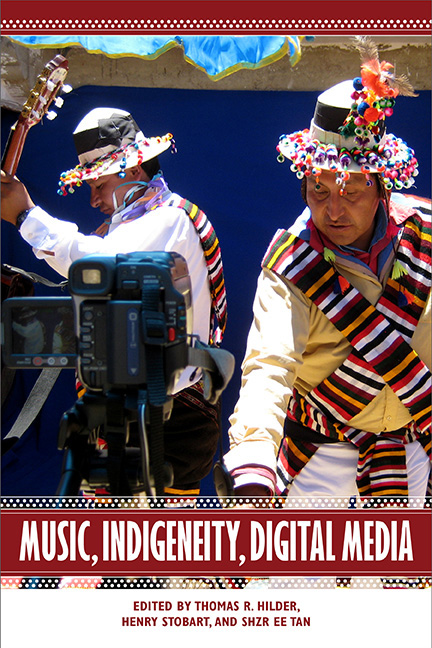Book contents
- Frontmatter
- Dedication
- Contents
- List of Illustrations
- Acknowledgments
- Music, Indigeneity, Digital Media: An Introduction
- 1 Taiwan's Aboriginal Music on the Internet
- 2 Recording Technology, Traditioning, and Urban American Indian Powwow Performance
- 3 YouTubing the “Other”: Lima's Upper Classes and Andean Imaginaries
- 4 An Interview with Russell Wallace
- 5 Mixing It Up: A Comparative Approach to Sámi Audio Production
- 6 Creative Pragmatism: Competency and Aesthetics in Bolivian Indigenous Music Video (VCD) Production
- 7 Keepsakes and Surrogates: Hijacking Music Technology at Wadeye (Northwest Australia)
- 8 The Politics of Virtuality: Sámi Cultural Simulation through Digital Musical Media
- Selected Bibliography
- List of Contributors
- Index
4 - An Interview with Russell Wallace
Published online by Cambridge University Press: 26 April 2018
- Frontmatter
- Dedication
- Contents
- List of Illustrations
- Acknowledgments
- Music, Indigeneity, Digital Media: An Introduction
- 1 Taiwan's Aboriginal Music on the Internet
- 2 Recording Technology, Traditioning, and Urban American Indian Powwow Performance
- 3 YouTubing the “Other”: Lima's Upper Classes and Andean Imaginaries
- 4 An Interview with Russell Wallace
- 5 Mixing It Up: A Comparative Approach to Sámi Audio Production
- 6 Creative Pragmatism: Competency and Aesthetics in Bolivian Indigenous Music Video (VCD) Production
- 7 Keepsakes and Surrogates: Hijacking Music Technology at Wadeye (Northwest Australia)
- 8 The Politics of Virtuality: Sámi Cultural Simulation through Digital Musical Media
- Selected Bibliography
- List of Contributors
- Index
Summary
I am a composer, a producer, and a traditional Lil'wat singer. My education has encompassed numerous disciplines, including performing arts, information technology, creative writing, and ethnomusicology. I compose soundtracks for film, television, and theater productions; I produce my own CDs, which have been nominated for awards in Canada and the United States; and I have been composer in residence for the Aboriginal Dance Program at the Banff Centre for the Arts. Currently, I teach at the Native Education College, Capilano University, and the Vancity Office of Community Engagement at Simon Fraser University. This interview arose out of an invitation by Thomas Hilder, whom I met at the ICTM Colloquium “Indigenous Music and Dance as Cultural Property: Global Perspectives” in Toronto, May 2008. The questions, developed by Thomas, inquire specifically about issues of Indigenous music and digital media. My responses reveal my own personal experiences with musical media throughout my career and my views on pertinent issues of Indigennous musical transmission, production, composition, as well broader political concerns. The interview was conducted via e-mail over the course of numerous months and is thus the result of an extended digital dialogue between colleagues and friends.
Describe briefly your education and current work with music as a singer, composer, producer, and pedagogue.
Most of my knowledge comes from my mother, Flora Wallace, who was a traditional singer from the St'at'imc Nation (which is part of the Salish linguistic group). These teachings have helped me form my own views of music and philosophically inform my compositions. I grew up in Vancouver in the Mount Pleasant area, which back in those days was a diverse working-class neighborhood. I was exposed to a variety of songs from different musical cultures. I also started in radio at a young age (through the high school I was attending), which further broadened my musical exposure.
When I speak of my education, many things have contributed to it that were not necessarily academic. I started at a community radio station called Vancouver CO-OP Radio and that had many music programs that specialized in many music forms (electro-acoustic, experimental, reggae, punk, and many other forms).
- Type
- Chapter
- Information
- Music, Indigeneity, Digital Media , pp. 95 - 105Publisher: Boydell & BrewerPrint publication year: 2017

